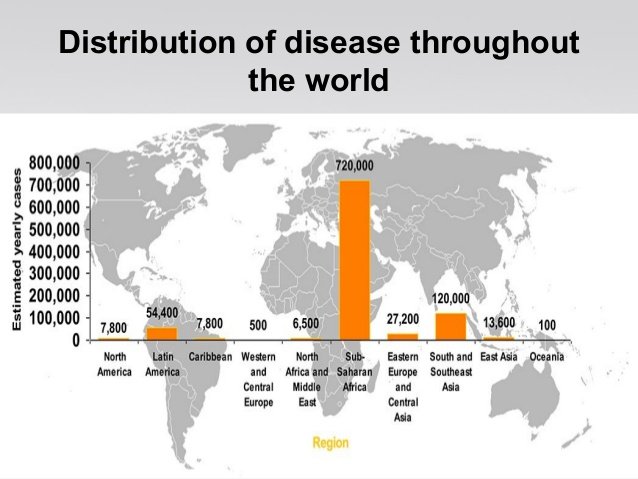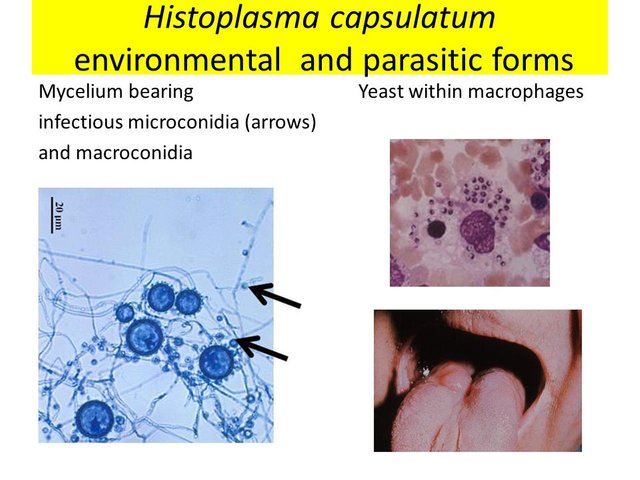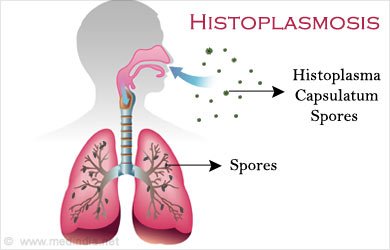HISTOPLASMOSIS
Histoplasmosis is a disease caused by the fungus Histoplasma capsulatum
It is also known as Cave disease, Darling's disease, Ohio valley disease and Reticuloendotheliosis.
This fungus usually lives in environment particularly in soil that contains large amount of bird or bat droopings. In US it is mostly concentrated in the soil of central and eastern states, especially areas around the Ohio and Mississippi River valleys.This fungus is also present in parts of Central and South America Asia, Africa and Australia.
People usually get infected when they breathe spores of histoplasmosis. This can be due to the soil that is disturbed around them due to activities like excavation, cleaning of chicken coops, demolition OF buildings, and cutting of forest. Although some people may inhale them and may not get sick but those who have weak immune system may get severe disease. Soil enriched with bird or bat droppings promotes the growth and sporulation of Histoplasma.
How common is Histoplasmosis in World and USA?

Image source: www.slidesharecdn.com
According to CDC(Center of disease control and prevention) estimated 60% to 90% people who live in areas surrounding the Ohio and Mississippi River valleys have been exposed to the fungus during there lifetime.
3.4 to 6.1 cases/ 100,000 above 65 years age population in US for histoplasmosis have been reported by some studies.
How histoplasma infects people?
Histoplasma is a dimorphic fungi which means that it can exist in 2 forms one is microconidia and another form is yeast.

Image source: www.slideplayer.com

Image source www.medindia.net
These microconidia are very small enough(0.002 - 0.004 mm) to enter into your terminal bronchioles and alveoli. Shortly after that this microconidial form will transform into yeast inside macrophage and other phagocytic cells.
Severity of disease will depend upon your immune system. If immune system of person is strong the spread of disease will be limited but if immune system is weak disease will spread to whole body and may spread to other organs.
People with weak immune system are
- Have HIV/AIDS and Diabetes
- Have had an organ transplant
- Are taking medications such as corticosteroids/TNF-inhibitors
Infants
Adults aged 55 and older
Depending upon your immune system it's possible that you may not get this disease if once you are infected or it may be less severe than the first one. For those who have weak immune system Histoplasmosis may remain hidden in body for months or years and may reappear later.
What symptoms does histoplasma infected people develop?
Most people who are exposed to the fungus may never experience any symptom. Others may have flu-like symptoms.
Usually takes 1-4 weeks after exposure to develop symptoms.
• Fever
• Cough
• Fatigue (extreme tiredness)
• Chills
• Headache
• Chest pain
• Body aches
SEVERE HISTOPLASMOSIS:
People with weakened immune system, histoplasmosis destroys the lung and debilitates persons day activities by spreading to other organs
These include following diseases:
Chronic cavitary histoplasmosis
Fibrosing mediastinitis
DIAGNOSING & TESTING
Health care provider will ask for travel history, symptoms, physical examination and lab tests to diagnose
Lab test include
• Blood samples
• Sputum culture
• Bronchoalveolar lavage fluid: fluid from respiratory tract
• Tissue biopsy
• Culture reports
• Chest x-ray Chest, CT scan and MRI of CNS and lungs
Reports usually come by few days but culture report may take weeks.
How is Histoplasmosis treated?
Mostly Antifungals are given this include Amphotericin B+Itraconazole for severe cases this may take 12 weeks to complete the course. Fibrosing mediastinitis may not respond to the antifungals.
How to prevent Histoplasmosis?
Avoid doing activities that are known to be associated with getting histoplasmosis.
- Soil digging where there are bird or bat droppings
- Cleaning chicken coops
- Exploring caves
- Cleaning, remodeling, or tearing down old buildings
References
• Harrison Principles of Internal medicine 18th ed
• https://www.cdc.gov/fungal/diseases/histoplasmosis
• http://www.mayoclinic.org/diseases-conditions/histoplasmosis
• https://en.wikipedia.org/wiki/Histoplasmosis
Stay safe and take care. If you like my presentation upvote and follow @meetsin